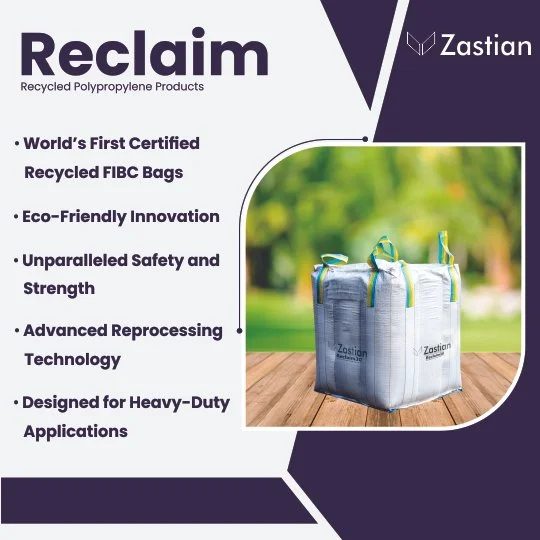Revolutionizing Plastic Recycling.
Driving Sustainability Through Innovative Packaging Solutions
The global conversation around sustainability has never been more crucial, with industries increasingly adopting innovative solutions to meet environmental challenges. The shift towards waste reduction, recycling, and eco-friendly materials is reshaping the packaging sector, offering new ways to meet industrial needs while reducing environmental impact. Here's how innovative practices are transforming the industry.
1. Smarter Product Design
Advancements in polymer processing have introduced technologies like Reclaim, which incorporate over 30% recycled polypropylene into packaging solutions such as FIBCs (Flexible Intermediate Bulk Containers). These cutting-edge bags meet rigorous safety standards with Safety Working Loads ranging from 1000 kg to 1500 kg, adhering to a 5:1 Safety Factor.
Additionally, contamination-free production systems ensure the highest quality packaging for sensitive applications like food and healthcare. Controlled environments with HEPA filtration and compliance with international standards, such as BRC and ISO 22000 HACCP, enable the production of clean, safe, and reliable packaging solutions.
2. Transitioning to Eco-Friendly Materials
A major shift in the packaging industry is the adoption of sustainable materials like woven polypropylene fabric. This durable and recyclable material reduces packaging waste by up to 30% compared to traditional alternatives, making it a key player in the move towards sustainable packaging.
These durable bags provide long-term solutions, replacing single-use plastics and significantly lowering environmental impact.
3. Designing for Longevity and Reuse
Longevity is central to sustainable design. FIBCs, capable of carrying up to 2500 kgs (5511 lbs), are reusable when handled properly. This reduces the frequency of replacements, cutting down on packaging waste while supporting industries such as agriculture, chemicals, and construction in their sustainability goals.
By creating durable products, industries can achieve a lower ecological footprint without compromising performance.
4. Customization for Better Resource Management
Tailored packaging solutions minimize waste and optimize resources. Custom-designed FIBCs cater to specific needs, such as grains, powdered chemicals, or hazardous waste, enabling industries to use the precise amount of material required.
Customization also supports branding opportunities, offering additional value through printed designs that align with corporate identity and messaging.
5. Promoting Awareness and Collaboration
Education and collaboration play a vital role in driving sustainable practices. By engaging stakeholders across supply chains, the benefits of eco-friendly packaging solutions are highlighted, encouraging industries to transition to greener alternatives.
Collaboration fosters innovation and promotes the adoption of circular economy principles, creating a collective impact on sustainability goals.
What’s Your Role in This Revolution?
Industries from agriculture to construction have a unique opportunity to embrace sustainable packaging solutions. By rethinking traditional practices and adopting eco-friendly alternatives, businesses can contribute to a greener planet while achieving operational efficiency.
Join the movement towards sustainability and discover how innovative packaging solutions can benefit your business and the environment.
